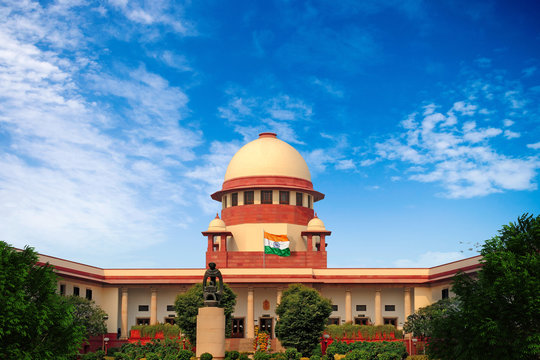Introduction
Power of Judicial Review In the Indian legal system, Article 32 of the Constitution of India plays a crucial role in safeguarding the fundamental rights of its citizens. The power of judicial review granted by Article 32 empowers the Supreme Court of India to ensure the protection and enforcement of fundamental rights. This article explores the significance, scope, and implications of Article 32 and the power it bestows upon the Supreme Court of India.

Article 32 Power of Judicial Review by Supreme Court of India
The power of judicial review vested in the Supreme Court of India under Article 32 is a cornerstone of the Indian Constitution. It serves as a vital mechanism for the protection and enforcement of fundamental rights. The Supreme Court, being the ultimate interpreter of the Constitution, possesses the authority to strike down any law, executive action, or governmental order that violates the fundamental rights enshrined in the Constitution.
Understanding Article 32
Article 32 grants every citizen of India the right to move the Supreme Court directly in case of a violation or threat to their fundamental rights. It acts as a safeguard against arbitrary actions and ensures that individuals can seek redressal for any infringement of their fundamental rights. Article 32 not only empowers the Supreme Court to protect individual rights but also serves as a check on the legislative and executive branches of the government.
Scope of Article 32
The scope of Article 32 is extensive, covering a wide range of fundamental rights guaranteed by the Constitution. These rights include the right to equality, right to freedom of speech and expression, right to life and personal liberty, right against discrimination, and many others. The Supreme Court has the power to intervene and provide relief when these fundamental rights are violated or threatened by any authority, be it the government or private entities.
Landmark Cases
Over the years, the Supreme Court of India has delivered several landmark judgments through the exercise of its power under Article 32. These judgments have significantly influenced the development and interpretation of fundamental rights in India. Let’s explore some of these significant cases:
1. Kesavananda Bharati v. State of Kerala
This historic case, heard by a 13-judge bench, established the basic structure doctrine of the Constitution. The Supreme Court, using its power under Article 32, held that the Parliament cannot amend the basic structure of the Constitution. This case reaffirmed the supremacy of the Constitution and its fundamental rights.
2. Maneka Gandhi v. Union of India
In this case, the Supreme Court widened the scope of personal liberty and due process of law under Article 21. It held that the right to travel abroad is an essential part of the right to personal liberty. The court, using its power of judicial review, struck down the government’s arbitrary action of impounding Maneka Gandhi’s passport.
3. Vishaka v. State of Rajasthan
This landmark case highlighted the Supreme Court’s role in protecting the rights of women in the workplace. The court, through its power under Article 32, laid down guidelines to prevent sexual harassment at workplaces. This judgment provided a framework for the protection of women’s rights and set a precedent for future cases.
FAQs about Article 32 Power of Judicial Review by Supreme Court of India
Q1: What is the significance of Article 32 in the Indian Constitution?
Article 32 is of immense significance as it grants individuals the right to directly approach the Supreme Court for the enforcement of their fundamental rights. It acts as a constitutional safeguard against violations of these rights and ensures access to justice for every citizen.
Also Read Social Media Laws and Their Implications: Navigating the Digital Landscape in 2023
Q2: Can the Supreme Court review any law or action under Article 32?
Yes, the Supreme Court can review any law, executive action, or governmental order that violates or threatens the fundamental rights guaranteed by the Constitution. The power of judicial review under Article 32 empowers the court to strike down such laws or actions.
Q3: What is the difference between Article 32 and Article 226?
While Article 32 empowers the Supreme Court for the enforcement of fundamental rights, Article 226 grants the High Courts of India the power of judicial review. The scope of Article 32 is wider, as it allows direct recourse to the Supreme Court, whereas Article 226 enables individuals to approach the respective High Courts.
Q4: How does Article 32 contribute to the concept of checks and balances in India?
Article 32 acts as a check on the legislative and executive branches of the government by providing citizens with a constitutional remedy for the violation of their fundamental rights. It ensures that no authority can act arbitrarily and provides a mechanism for the judicial scrutiny of governmental actions.
Q5: Can the Supreme Court use Article 32 to protect non-fundamental rights?
No, the power of judicial review under Article 32 is limited to the protection and enforcement of fundamental rights. However, the Supreme Court can indirectly protect non-fundamental rights if they are connected to or intertwined with the violation of fundamental rights.
Q6: Is the power of judicial review absolute?
No, the power of judicial review is not absolute. The Supreme Court exercises its power within the limits prescribed by the Constitution. It must strike a balance between the protection of fundamental rights and the principle of separation of powers.
Conclusion
Article 32 of the Indian Constitution grants the Supreme Court of India the power of judicial review, which is vital for the protection and enforcement of fundamental rights. Through the exercise of this power, the Supreme Court has played a significant role in shaping the legal landscape of India and ensuring access to justice for its citizens. The power of judicial review acts as a check on the other branches of government and reinforces the supremacy of the Constitution. It is a testament to the commitment of India’s constitutional framers to uphold the principles of justice, equality, and individual rights.

